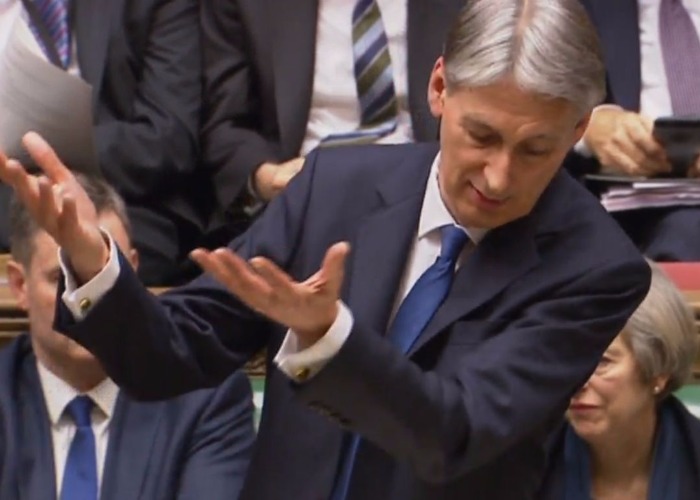UK Spring Budget 2017: what it means for pensions, social care, buy-to-let and more

Chancellor Philip Hammond has used his 2017 Spring Budget speech to unveil a number of changes to your finances. Here’s everything you need to know.
A boost for social funding and tax hikes for self-employed workers were among the key announcements made by Chancellor Philip Hammond in his 2017 Spring Budget.
Here’s a comprehensive look at what today’s speech will mean for your money.
Pressed for time? Have a read of our key Budget points at a glance instead.
Elderly
The Chancellor highlighted that there are now 500,000 more Brits aged over 75 than in 2010, with that number set to rise further still in the coming years.
To ease the mounting burden on the NHS, Hammond pledged an additional £2 billion of social care funding to be made available in England over the next three years, with half of that coming in the 2017/18 tax year.
There will also be a separate £100 million fund created to help fund triage projects in A&E departments in England in order to ease pressure on them next winter.
In a reference that will no doubt have angered the opposition, he said: “We are the party of the NHS. We have the economic plan that will secure the future of our most important public service.”
Further details on how these projects will work are expected later this year.
While the £3 billion social care pledge is a welcome boost, some have questioned whether the chancellor should have taken more drastic steps.
Gordon Andrews, financial planner at Old Mutual Wealth, said: “We are still a long way from realising a long-term policy solution to the question of social care.
“Tweaks, such as giving councils the freedom to raise care funding through tax increases, or the £3 billion of social care funding announced today might provide a sticking plaster.
“But there is still serious work to be done to tackle the question of long-term care.”
State Pension rises
As expected, the chancellor confirmed the State Pension will rise by 2.5% from April.
It means anyone on the flat-rate State Pension will see their weekly payments edge up £3.90 to £159.55 from April, while those on the ‘old’ State Pension will rise to £3 to £122.30.
MPAA is cut
Over-55s hoping the chancellor would backtrack on his plans to reduce the amount that someone can save into a pension once they have accessed some of their pot were left disappointed.
As of April, the Money Purchase Annual Allowance (MPAA) will be slashed from £10,000 to just £4,000.
Critics – specifically those in the pension industry– say the reduction flies in the face of the new pension freedoms as those who access funds are effectively being punished with a huge drop in their annual allowance.
However, the chancellor was unmoved by those claims and will press ahead with the reduction.
Self-employed
There was a tax hike for the nation’s five million self-employed workers.
Hammond said the National Insurance rate for this booming group will increase by 1% to 10% in 2018, with a further 1% hike to 11% in 2019.
This will cost workers an extra 60p per week, or £31 a year.
Savers
There were no new announcements affecting savers, but he did confirm a raft of expected changes.
The amount we can save into a tax-free ISA each year will increase from £15,240 to £20,000 in the new tax year as expected.
The increase will coincide with the launch of the Lifetime ISA which, as you’ll recall, will only be available to those aged under 40.
The 'LISA' is designed to make saving for retirement or a deposit on a property more attractive by including a Government bonus of 25% on any savings deposited into the account (with the maximum bonus capped at £1,000 a year).
He also confirmed the launch of the launch of the NS&I Savings Bond, which is far less generous – but at least it’s available to everyone.
It’ll pay a rate of 2.2% and you can invest a maximum of £3,000.
While the rate is generous when compared to normal savings accounts, it’s worth pointing out that the Bank of England expects inflation to rise as high as 2.7% this year, so savings in this bond could actually lose value in real terms.
Investors

Bad news for anyone holding a hefty investment portfolio: the tax-free Dividend Allowance has been slashed from £5,000 to £2,000.
It’s effectively a clampdown on high earners who ease their tax burden by taking earnings through dividends rather than their salary.
The chancellor claims 80% of general investors will pay no dividend tax despite the reduction.
Small business owners
The chancellor also took steps to ease the tax burden on small business owners.
In the build up to the Budget, it was revealed that planned Business Rate revaluations coming into effect in April could see some businesses hit with a 400% hike in rates overnight.
The Government had pledged help in the form of a £3.6 billion fund, but critics said this fell short of what will be needed.
He has responded by announcing three measures.
- Any business that was set to lose their rate relief as part of the revamp will see their increases capped at £50 a month.
- A further £300 million discretionary fund will be set aside to firms particularly hard hit.
- Pubs with a rateable value of less than £100,000 will get a £1,000 discount in the new tax year. This will benefit nine in 10 pubs.
“Taken together, this is a further £435 million cut in business rates, targeted at firms facing the largest rises,” Hammond said.
He also confirmed that Corporation Tax would fall to 17% by 2020, as expected.
Workers

The Personal Allowance will increase by £500 in the new tax year, meaning the first £11,500 earned is tax free. This will gradually increase to £12,500 by 2020.
Higher-rate taxpayers
The point at which the higher rate of tax kicks in will also rise in April, from £43,000 to £45,000. By 2020 this will be increased to £50,000 as planned, the chancellor confirmed.
Low-paid workers
The National Living Wage will rise to £7.50 in April, as expected.
Landlords
He didn’t actually mention it in his speech, the buy-to-let (BTL) clampdown on mortgage tax relief will go ahead as planned.
Up until now, landlords have been able to deduct all their mortgage interest (and other costs associated with a property) from rental income before calculating their tax bill.
However, this will fall to 75% as of 6 April, and will be gradually reduced until it is scrapped in 2020 and replaced with a flat 20% tax relief.
For landlords with hefty BTL mortgages, tax bills will rise by hundreds, or even thousands, of pounds.
Need to cut your BTL costs? Read our guide
Shoppers
The chancellor also confirmed he will give regulators greater powers to fine companies that use confusing financial jargon in order to trick customers into signing up for products or services they didn't really want.
So, for example, getting people to sign up for a subscription service.
Parents
Hammond confirmed funding for an extra 110 free schools, on top of the 500 the Government had already announced.
There was also some assistance for low-income families: free school transport will be extended to all pupils on free school meals at a selective school.
Commuters
In a bid to ease congestion woes in England, Hammond announced he would be launching a £690 million competition for local authorities to tackle congestion in cities and ease the burden on local transport networks.
Motorists

In a blow for motorists, Vehicle Excise Duty on cars registered before April will rise at the RPI rate of inflation, which is generally far higher than the official CPI rate.
This comes on top of a hike to the Insurance Premium Tax, which will see drivers paying more for their car cover.
Holidaymakers
Get ready to pay even more for your flights: Air Passenger Duty (APD) rates for 2018-19 will be increased in line with RPI.
Sinners
Alcohol Duty will rise by RPI, while the tax on cigarettes will increase by 2% above RPI.
There was a second blow for smokers in the form of a Minimum Excise Duty on cigs, which effectively means a pack can’t cost less than £7.35.
Bad news if you’re a fan of cheaper brands…
Share your thoughts
And that’s about it. We’ll be adding to this piece throughout the day.
Do let us know what you thought of Hammond’s Budget in the comments section below.
Give your own budget a boost: slash your monthly bills with loveMONEY by searching for cheaper mortgage, car insurance and energy deals.
Read more on loveMONEY:
The key Budget points at a glance
How to boost your pension contributions
Huge bill shock for E.On customers
Comments
Be the first to comment
Do you want to comment on this article? You need to be signed in for this feature